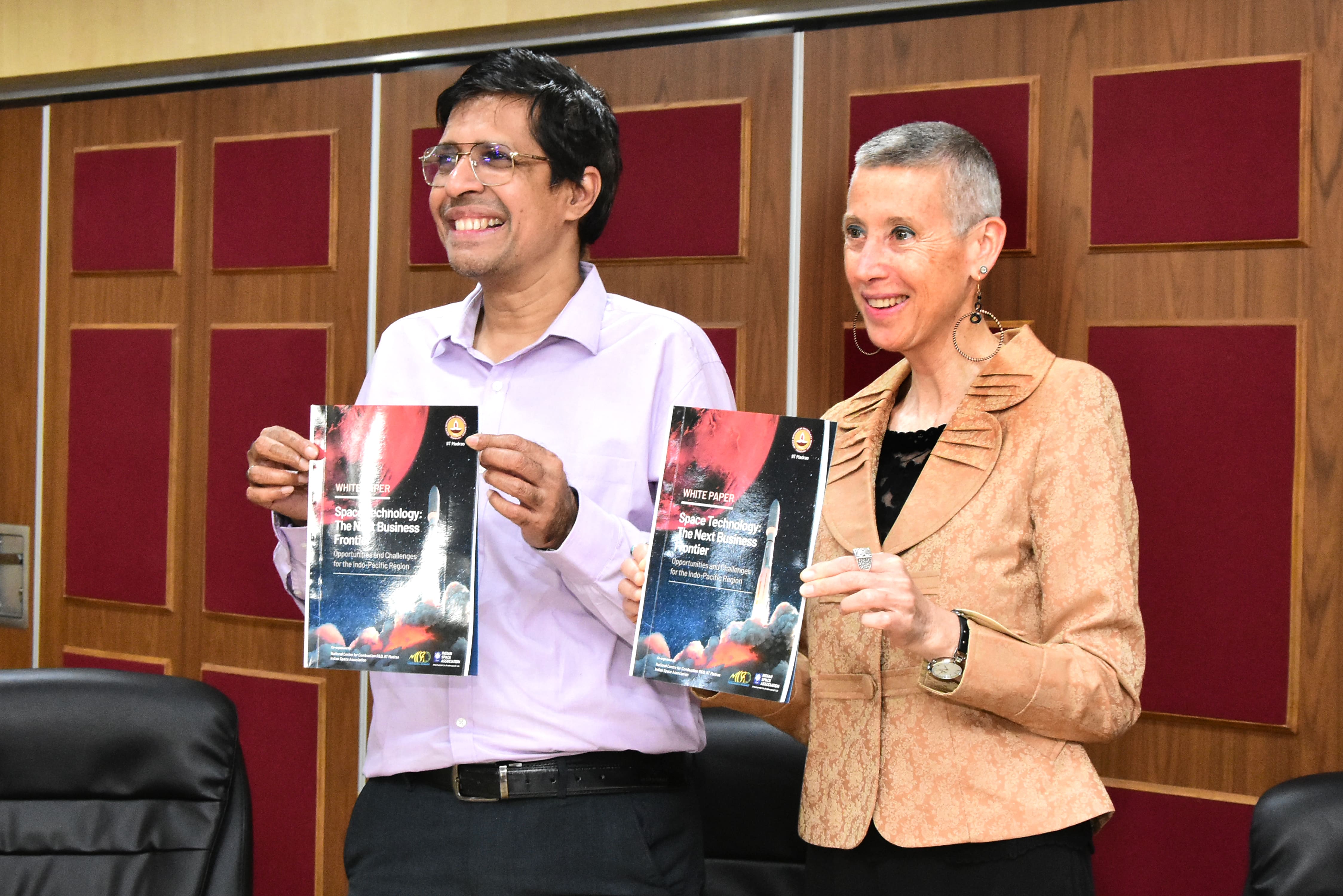Special Service and Features
IIT Madras, U.S. Consulate General Chennai & Indian Space Association call upon Indo-Pacific Countries to boost scientific and business collaboration in the Space sector
Posted On:
10 FEB 2023 12:59PM by PIB Chennai
Indian Institute of Technology Madras (IIT Madras), the U.S. Consulate General Chennai and Indian Space Association (ISpA), a non-profit industry body, have called upon governments and the business community in Indo-Pacific countries to boost scientific and business collaboration in the space technology sector.
They highlighted three core areas where further collaboration would lead to the greatest benefit -- Make in Space for Use in Space, Make on Earth for Use in Space and Make in Space for Use Back on Earth.
Prof. V. Kamakoti, Director, IIT Madras, on 25th January 2023 released a Whitepaper titled ‘Space Technology: The Next Business Frontier - Opportunities and Challenges for the Indo-Pacific Region’ and presented the first copy to Judith Ravin, U.S. Consul General in Chennai.
The Whitepaper will be shared widely with key stakeholders in India, the United States, Indo-Pacific and other countries who are leaders or emerging or are planning to develop the space industry sector in their countries. It can be accessed using the following link - https://spaceconclave2022.wixsite.com/spaceconclave/our-vision
The Whitepaper is an outcome of a three-day international conclave hosted by IIT Madras in collaboration with ISpA and supported by the U.S. Consulate General Chennai, from 15th to 17th October 2022. The participants included representatives of public and private sector space agencies from fifteen countries including the National Aeronautics and Space Administration (NASA), JAXA (Japan Aerospace Exploration Agency), the Australian Space Agency (ASA) and Indian Space Research Organization (ISRO).
Besides the Whitepaper, another major outcome of the Space Conclave was the announcement of the creation of the Association of Space Entrepreneurs in the Indo-Pacific (ASEIP), a networking and lobbying platform focused on innovation and entrepreneurship in the space sector.
Speaking during the White Paper release event, Prof. V. Kamakoti, Director, IIT Madras, said, “The space sector, particularly in India, is moving towards large-scale
commercialization. Many private players and start-ups are in advanced stages looking at many areas such as rapid launches, sea launch, and different satellites that can be launched. What is exciting today is that we are able to close things faster due to policies and also due to the lot of collaborations. I would like Space Tech Conclaves to become an annual event with sub-group meetings happening at regular intervals.”
The White Paper's conclusions are focused on four thematic areas -- International Collaboration, Scientific Research and Development, Space Entrepreneurship and Business and Space Policy.
Emphasising the need for collaboration in the space sector, Ms. Judith Ravin, U.S. Consul General in Chennai, said, “This effort is an example of the US Government commitment to US-India Space Cooperation. Efforts undertaken through this grant also demonstrate collaboration by the US Consulate General in Chennai and IIT Madras in support of key areas of US-India partnership. A recent report by the Space Foundation indicated that between 2020 and 2021, the global space economy value rose to $470 billion as Government and space commercial ventures continue to grow.”
Ms. Judith Ravin added, “According to the same report, space economy is expected to grow beyond $630 billion in 2026. While Indian share constitutes only 2-3% of the global space economy, its space sector is poised to grow to $13 billion by 2025, fuelled by an emerging private sector with numerous start-ups driving growth and innovation.”
The Whitepaper notes that international cooperation has been part of the Indian space programme since its inception. Components of international cooperation were present in many significant milestones in the Indian Space Programme including the establishment of Thumba Equatorial Rocket Launching Station, conduct of the Satellite Instructional Television Experiment and Satellite Telecommunication Experiment Project, launches of Aryabhata, Bhaskara, Ariane Passenger Payload Experiment (APPLE), IRS-IA, IRS-IB satellites, INSAT series of satellites and the Mission to Moon, among others.
Highlighting the key recommendations of this Whitepaper, Prof. Satyanarayanan Chakravarthy, Coordinator, National Centre for Combustion Research and Development (NCCRD), IIT Madras, said, “The urgent necessity that this initiative identified is to start and deliberate legal and policy frameworks related to the space ecosystem. There are many issues where policy initiatives are necessary. It ranges from space debris management, space science regulations, communication (in Space), Launch facilities/spaceports-related activities, space patent landscape, etc.”
The key recommendations in the Scientific R&D Theme in the Whitepaper focus on Space manufacturing:
Make in Space for Use in Space
- Developing building materials like concrete or its analogues using regolith etc., available on planets, and curing with deficient amounts of water or its analogues.
- Developing a robotic drilling system that can be remotely commanded from earth or orbiters and work in an intelligent self-correcting way to deal with unknown subsurface soil encountered without breaking drills or changing drills
- Researchers are exploring the possibility of extracting valuable elements such as copper and other rare earth elements of used electronics to be reprinted as new electronics, etc.
Make on Earth for Use in Space
- Further advances in 3D printing of metals like titanium and aluminium alloys, composites (CFRP) and refractory materials like tungsten, molybdenum, and tantalum for high-performance applications in space engineering.
- Further advances in intelligent manufacturing, including collaborative robots, artificial intelligence and machine learning.
- Integrated electronic system designs aim to be “universal, series, modular” and allow a high level of integration, scalable processing performance, and a high degree of customisation.
Make in Space for Use Back on Earth
- To identify suitable materials like silicon-based fibres, semi-conductor, and carbon nanomaterials and test them on earth under low gravity conditions.
- Developing scalable 3D bioprinters for organ printing and manufacturing systems to make protein crystals, pharmaceutical drugs, etc., in LEO.
- Developing manufacturing processes that enable the recycling of materials.

***
(Release ID: 1897909)
Visitor Counter : 373